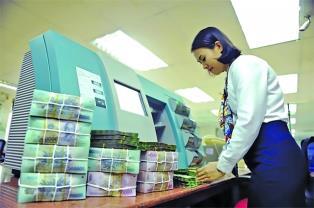Alongside adjustments to deposit rates, lending rates across the market continue to decline.

HÀ NỘI — Domestic deposit interest rates at commercial banks have remained relatively stable since the beginning of the year, according to the State Bank of Vietnam (SBV).
Since early July, some commercial banks have moved to slightly lower their rates.
Bắc Á Bank reduced deposit rates by 0.1 percentage point across all terms and deposit types. VIB cut its 36-month counter rate by 0.1 percentage point for deposits ranging from VNĐ1 billion to below VNĐ5 billion. Meanwhile, Bảo Việt lowered its rates by between 0.15 and 0.2 percentage point per annum for terms of six to 13 months.
This follows similar adjustments by other financial institutions.
LPBank cut online deposit rates by 0.2 percentage point for terms ranging from 18 to 60 months, while the National Citizen Bank (NCB) reduced rates by 0.1 percentage points depending on the term, aiming to maintain competitiveness in capital mobilisation. These changes are seen as part of a broader strategy to balance capital costs and create room for future lending rate reductions.
Of the Big 4, Agribank currently offers some of the most competitive online savings rates among the Big 4 banks, with 1–18 month terms ranging from 2.4 to 4.8 per cent per annum. Its highest rate is 4.9 per cent for a 24-month term — equal to BIDV but slightly below VietinBank’s 5 per cent.
Vietcombank offers VND deposit rates from 0.20 per cent for non-term deposits to up to 4.70 per cent for 12–48 month terms, with similar rates for businesses. Preferential loans include home loans from 3.99 per cent (valid until 31 March 2026) and salary-based loans from 6.0 to 7.5 per cent.
Short-term business loans start at 4.6 per cent, with green SME loans from 4.2 per cent. Fixed rates for mortgages, car and consumer loans range from 5.5 to 5.7 per cent, while longer-term packages under the “An tâm lãi suất” (Peace of Mind Interest Rate) programme offer 6.2–9.5 per cent.
Lending rates continue to fall, with the average new rate now at 6.23 per cent — down 0.7 percentage points since late 2024 — easing access to credit and supporting economic growth.
In practice, the approach ofmaintaining stable deposit rates while gradually lowering lending rates reflects the banking sector’s efforts to balance the interests of depositors and borrowers.
This dual approach supports capital mobilisation while fostering a more favourable environment for economic activity, particularly for small- and medium-sized enterprises, which continue to seek affordable financing to sustain operations. — BIZHUB/VNS





